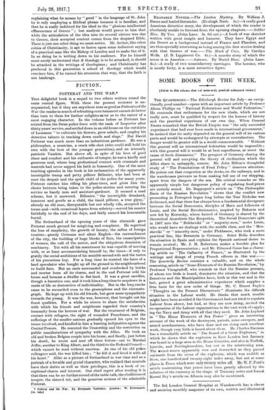SOME BOOKS OF THE WEEK.
INoec• in 04 Mums don eel neeurarily preeNis ceesqucig reet..1 THE QVABTEHLTES.—The Edinburgh Review for July—an excep- tionally good number—opens with an important article by Profeaser Alison Phillips on "National Federations and World Federation."
He contends that enthusiaam for the new ideal., which are not really new, must he qualified by respect for the lessons of history
and the practical experience of our own (lay. When General Smuts remarked that the British Empire was " the only successful experiment that had ever been made in international government," he insisted that its unity depended on the general will of its various parts and would be endangered by attempts at centralization. The danger would be greater still in a world-commonwealth. " Without
this general will an international federation would be impoesilde ; with this general will it would be at best superfluous, at worst the cause of fresh dissensions." The prospect of Germany sharing the general will and accepting the theory of civilization which the Allies share is, unhappily, remote. Mr. John Hilton's thoughtful study of " The Foundations of Food Policy" deserves attention.
He points out that congestion at the docks, on the railways, and in the warehouses prevents us from making full use of our shipping, apart from the dangers of the sea. His critical remarks on the apparently simple but dangerous policy of regulating food.prices are entirely sound. Dr. Rappoport's article on "The Philosophic Basis of the Russian Revolution" shows that the conflict now proceeding in Petrograd began long before the Tear Nicholas was dethroned, and that there has always been a fundamental divergence between the Social Democrats, disciples of Marx and followers of Lenin, and the Social Revolutionaries, inspired by 13akunin and now led by Kerensky, whose hatred of Germany is shared by the theoretical Anarchists like Kropotkin. The Social Democrats split in 1907 into the " Bolsheviki " or " majority-men," under Lenin, who would have no dealings with the middle etas., and the "Men.
sheviki " or "minority-men." under Plekhanov, who took a more practical line, like Bernstein in Germany. Sefior Bolin describes the situation in Spain and explains the Spanish national desire to remain neutral ; Mr. J. M. Robertson makes a forcible plea for Proportional Representation ; and Mr. Edmund Geese has a charm- ing article on "The Gallantry of France," as illustrated by the
writings and doings of young French officers in this war.— The Quarterly Bedew contains a valuable, and on the whole reassuring, article on "Some Elements of the Russian Revolution," by
Professor Vinogradoff, who reminds us that the Russian peasant, of whom too little is heard, dominates the situation, and that the Zemstvos and the Municipalities have, both in this war and in the
last, gained a great administrative experience which supplies a
firm basis for the new order of things. Mr. C. Ernest Fayle's " Thoughts on the Present Discontents" illuminate the difficult situation in the Labour world. He thinks that much trouble
might have been avoided if the Government had not tried to regulate Labour from above, but had, as they are now doing, invited the
co-operation of the Labour organizations in the vast work of suppl3 -
Mg the Navy and Army with all that they need. Mr. John Leyland in"The Minor Elements of Sea Power" gives an interesting account of the work of the destroyers, patrols, ll i ll e-sweepers, and armed merchantmen, who have done and are doing such excellent work, though very little is heard about them. Mr. Charles Davison has a remarkable article on •• The Sound of a Great Explosion," in which Ile shows that the explosion in East Lyndon last January was heard in a large area in the Male Counties, and aloe in Norfolk, Lincoln, and Nottinghamshire, but not in the intervening area. The sound-waves apparently rose and descended ae they passed outwards from the scene of the explosion, which was audible at Stow, one hundred and twenty-eight miles away, but not at some places in Essex which were only twenty miles off. Mr. W. F. Ford's article maintaining that prices have been greatly affected by the inflation of the Currency in the shape of Treasury notes and Ismail Kemal Bey's article on Albania may also be mentioned.


































 Previous page
Previous page